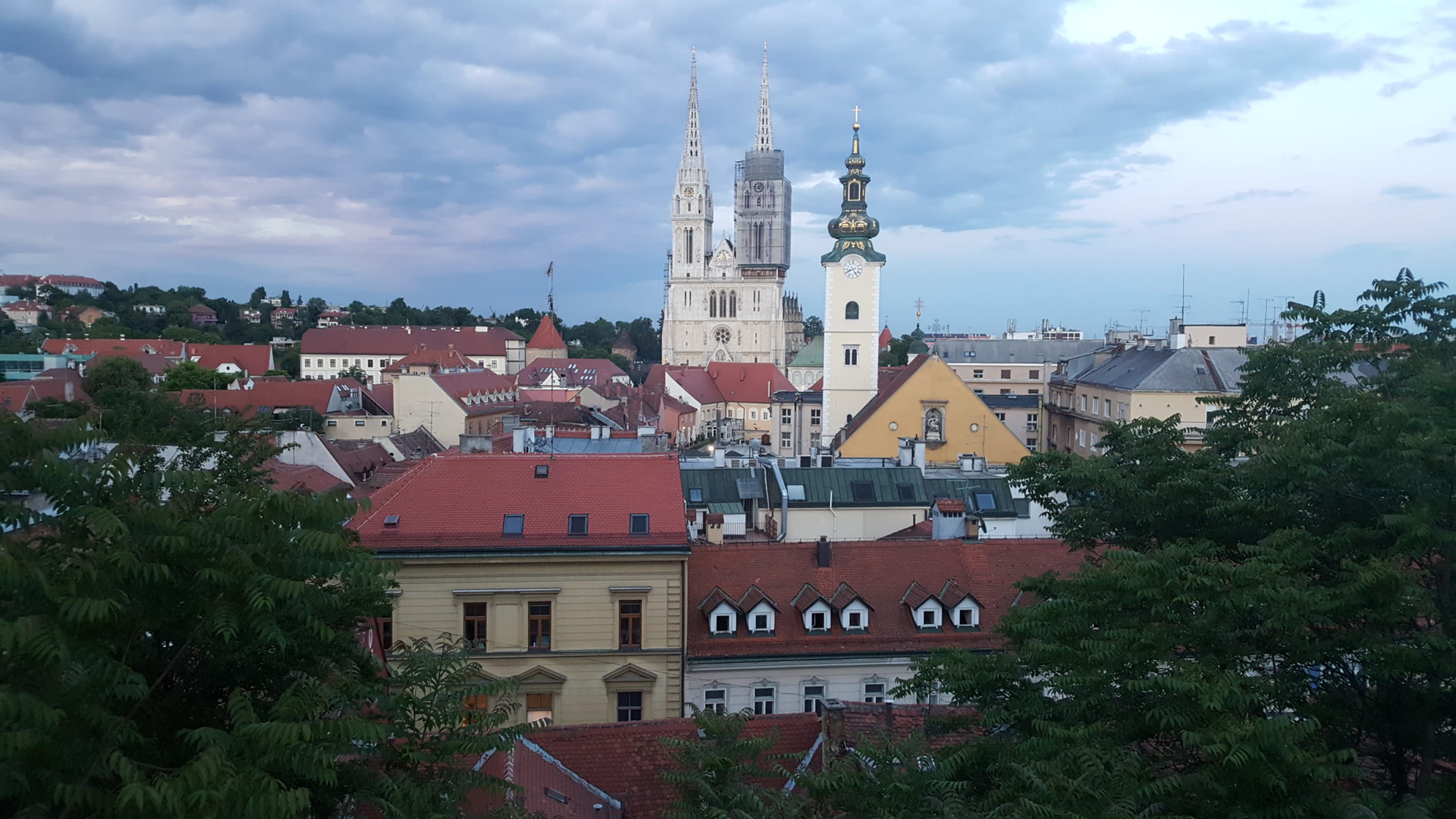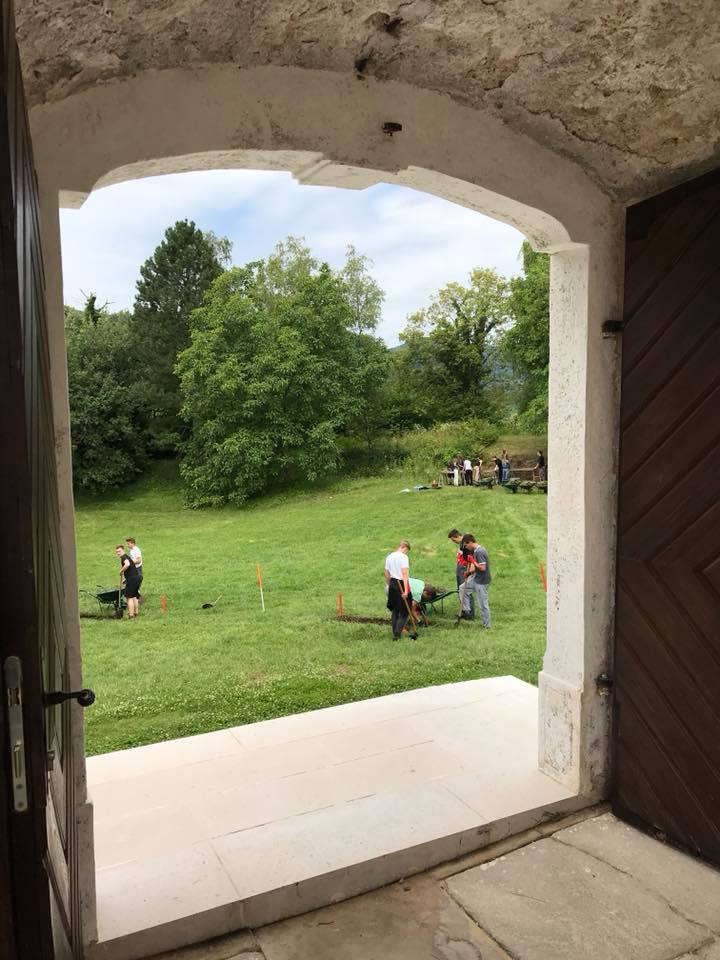Project Description
Overview
Lobor is a sacred archaeological site that has been active since prehistoric times. It played an important role in Late Antiquity when various barbarian groups (Germanic and others) crossed the borders into the Western Roman Empire. In the period between the 4th and 7th centuries, settlements were relocated to hilltops so that they could provide better protection for the inhabitants and make visual communication between such elevated spots easier. At that time, a large early Christian basilica was built in Lobor. It was probably erected on the site of a former temple dedicated to Diana. After the early Christian church was destroyed, first a pre-Romanesque church and then a Romanesque church were built. These churches marked another important period in Lobor’s history, the Carolingian period. The remains of the only wooden church known so far in northwestern Croatia have been discovered at the site. The wooden church is likely to have served as a temporary shrine between the respective periods of activity of the pre-Romanesque church and the Romanesque church. Since the very beginnings, the Lobor site has been associated with female cults, first the goddess Diana and later the Virgin Mary. It has remained so until today.
The churches are surrounded by a cemetery with burials dating back to prehistoric times and up to the 19th century. Every year, research into one part of the cemetery is conducted. Students learn the process of determining the area of a burial, cleaning the skeletons in the soil, drawing, photography, dealing with in situ finds, removing and packing the bones, and laboratory analysis of skeletons. The Bioarchaeological School at Lobor began is 2016 as the Croatian Science Foundation project. The projects aims to reconstruct the profile of communities that lived in the area, from trauma analysis to DNA and facial reconstruction of individual skeletons.
| Course Details | |
|---|---|
| Course Dates | June 16-July 13, 2024 |
| Course Type | Field Archaeology, Bioarchaeology, |
| Instructors | Dr. Krešimir Filipec, Jana Skrgulja, Petra Niksic, & Dr. Zdravka Hincak |
| Credits* | 8 semester (12 quarter) |
| Apply By | April 1 |
| Fees Due By | Summer 1 (May 1) |
| Program Fees | |
|---|---|
| Tuition | $4,475 |
| Transcript Fee* | $300 |
| Health & Evacuation Insurance | $125 |
| Room & Board | $1,955 |
| TOTAL: | $6,855 |
*This program may accept students past the deadline. Email admissions@ifrglobal.org for more information.
Instructors
The directors welcome emails and inquiries about the research elements of this project. More general information (tuition, health insurance, and payment schedule) can be found under the ‘Students’ tab above. Any further questions may be addressed to IFR staff. Additional details about research, course schedule, travel, accommodation, and safety can be found on the syllabus. Contacting the directors or the IFR office is encouraged and appreciated. It may help you determine if this field school is a good fit for you.
Testimonials
Coming soon!
Payment & Student Fees
Application Fee: There is a $45 fee to submit an online application.
Deposit Payment: A nonrefundable $500 deposit is due within 3 weeks of program acceptance in order to secure your place. The remainder of your program fees are due by the deadline indicated under “Course Details”.
*Transcript Fee & Academic Credit Opt Out: If you wish to participate in an IFR field school without earning academic credits, you will not be charged a transcript fee.
For more information about payment, fees, and policies, please see details under our Payment & Finances and Withdrawal and Cancellation Policy pages.
Accommodations
Students will stay in Zagreb for the beginning and end of this program, but the main accommodations will be at a hostel in Lobor. These will consist of 2 to 3 students per room, with shared bathrooms and a kitchen. Linens, blankets, pillows, and pillow cases are provided. Rooms will be cleaned and disinfected by the accommodation staff, and laundry facilities will be provided on-site.
Breakfast will be served at the accommodation.
Lunch will be chosen from a daily menu at local restaurant. The restaurant is able to accommodate vegetarians, vegans, and students with various dietary food intolerances. The students with specific dietary needs should report their preferences in the field school application.
Dinner will be served in the accommodation or at the site.


Travel Info
Natural disasters, political changes, weather conditions and various other factors may force the cancellation or alteration of a field school. IFR recommends students only purchase airline tickets that are fully refundable and consider travel insurance in case a program or travel plans must change for any reason.
General information for this program is below, but keep in mind we will discuss any updated travel information and regulations during the required program orientation, which could affect travel plans.
Purchase airline tickets to arrive at the Dr. Franjo Tuđman Airport in Zagreb on June 16, 2024
A program assistant will meet students at the airport and escort them to an accommodation in Zagreb. The exact time of the meeting will be provided after students confirm their flight bookings.
If students miss a connection or yhave a flight delay they should contact Ms. Jana Skrgulja or Ms. Petra Niksic. A local emergency cell phone number will be provided to all enrolled students.
VISA REQUIREMENTS
Citizens of the US, Canada, Japan, Republic of Korea, Australia and New Zealand do not need visa to visit Croatia for up to 90 days. All nationals who are holders of valid Schengen documents, as well as national visas and residence permits of Bulgaria, Cyprus, and Romania do not require an additional (Croatian) visa for Croatia. Citizens of other countries are asked to check the embassy website page at their home country for specific visa requirements. The Faculty of Humanities and Social Sciences at Zagreb University can send an official invitation letter that, if needed, can be used at the relevant embassy to secure a visa to the program.
Student Safety
The IFR primary concern is with education. Traveling and conducting field research involve risk. Students interested in participating in IFR programs must weigh whether the potential risk is worth the value of education provided. While risk is inherent in everything we do, we do not take risk lightly. The IFR engages in intensive review of each field school location prior to approval. Once a program is accepted, the IFR reviews each program annually to make sure it complies with all our standards and policies, including student safety.
Students attending IFR international programs are covered by a comprehensive Health Insurance policy that includes physical illness or injury, mental or chronic conditions. No deductible and 100% of costs are covered up to $250,000. In addition, we provide Political and Natural Disaster Evacuation policy, which allow us to remove students from field school location if local conditions change. Our field school directors are scholars that know field school locations and cultures well and are plugged in into local communities and state institution structures.
Students attending IFR domestic programs (within the US) must have their own health insurance and provide proof upon enrollment. IFR field school directors are familiar with local authorities and if in need of evacuation, local emergency services and/or law enforcement will be notified and activated.
The IFR has strong, explicit and robust policy towards discrimination and harassment in the field. If students feel they cannot discuss personal safety issues with field school staff, the IFR operates an emergency hotline where students may contact IFR personnel directly.
Call (877-839-4374) or email (info@ifrglobal.org) if you have questions about the safety of any particular program.











